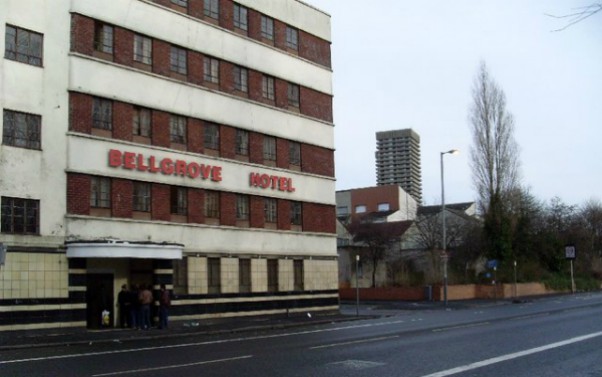
Dan Mushens, a recovery worker at Scottish mental health charity Penumbra, tells the story of Ronnie Clive’s recovery from homelessness, addiction and alcohol-related brain damage.
Ronnie Clive spent 11 years in the Bellgrove. Waking up to find mice in his bed, or catching a fleeting glimpse of cockroaches scurrying along the corridors wasn’t uncommon. He remembers the bedroom windows were barred like prison cells, and ambulances would regularly arrive to take away residents who had died there.
Although registered as a hotel, the Bellgrove, in the east end of Glasgow, is to all intents and purposes a hostel for over 140 homeless men – most of whom are experiencing severe drug and alcohol addiction. In 2014, the Scottish government described its conditions as ‘not dissimilar to that of a Soviet gulag’, with others likening it to a Victorian poorhouse.
In spring 2016, Ronnie was pushed down a stairwell at the Bellgrove. He can’t remember the exact circumstances leading up to the event, but it resulted in a hospital admission and a subsequent operation to remove a cancerous tumour.
When Ronnie looks back now, he says that as strange as it sounds, the hospital admission was the best thing that could have happened to him. It meant that he regained contact with his brother Mick, after years apart, and he was now in the system, getting his health care needs attended to by the appropriate professionals. Before, he had been unemployed, homeless, addicted to alcohol, exploited and seemingly discarded by society.
‘Strengths-based approach’
As a consequence of decades of heavy smoking, abusing alcohol and neglecting his nutrition, Ronnie now has a diagnosis of alcohol related brain damage (ARBD) and chronic obstructive pulmonary disease (COPD). He also struggles with his mobility and his memory.
Ronnie started receiving support from Penumbra, one of Scotland’s largest mental health charities, to assist with managing the manifestations of ARBD and increase his social inclusion. Ronnie had already made the conscious decision to give up drinking.
As a recovery-focused organisation, Penumbra placed an emphasis on goal-setting and concentrated on what Ronnie was able to do, using a strengths-based approach to build on his skillset. Even during the referral and assessment stage, it was apparent that Ronnie liked to have a good old chat with people or a ‘bleather’ as they say in Glasgow dialect.
To build on this, and promote Ronnie’s inclusion in the local community, he was supported to make a referral to the Good Morning service. This is a telephone-befriending charity for those experiencing isolation and loneliness. He gets three phone calls a week and enjoys having a chat “about anything and everything”. He says the calls give him an opportunity to take his mind off things.
Accessing this service has also helped Ronnie learn how to use a mobile phone. He was already able to receive calls by swiping the touch screen, but can’t make them, so he’s being supported to learn how to do that. Although Ronnie is unable to read or write, he has a good recognition of numbers, and he’s working at building on that strength to learn this new skill.
‘Safety and survival’
Ronnie was also signposted to the Glasgow Council on Alcohol for counselling services, after it became clear that despite his resilient nature, he was still struggling to deal with traumatic childhood events. He meets with a worker called Peter, who he says he enjoys talking to and is hopeful will be able to help him deal with some of these issues.
Ronnie frequently says that despite going through all he has gone through in life, and now being in his mid-sixties, he feels like a new man, who is having a new start in life.
In his own words: “I used to drink to numb the pain, I’d drink to forget certain things, I’d drink to keep warm, to feel happy, to feel safe and confident so that I could survive day-to-day.
“I can’t be sure what the future will hold for me, but I’ll tell you one thing: it can’t be any worse than the past. Onwards and upwards, that’s what I say.”


 Bournemouth, Christchurch and Poole
Bournemouth, Christchurch and Poole  Hampshire County Council
Hampshire County Council  Lincolnshire County Council
Lincolnshire County Council  Norfolk County Council
Norfolk County Council  Northamptonshire Children’s Trust
Northamptonshire Children’s Trust  South Gloucestershire Council
South Gloucestershire Council  Wiltshire Council
Wiltshire Council  Wokingham Borough Council
Wokingham Borough Council  Children and young people with SEND are ‘valued and prioritised’ in Wiltshire, find inspectors
Children and young people with SEND are ‘valued and prioritised’ in Wiltshire, find inspectors  How specialist refugee teams benefit young people and social workers
How specialist refugee teams benefit young people and social workers  Podcast: returning to social work after becoming a first-time parent
Podcast: returning to social work after becoming a first-time parent  Podcast: would you work for an inadequate-rated service?
Podcast: would you work for an inadequate-rated service?  Family help: one local authority’s experience of the model
Family help: one local authority’s experience of the model  Workforce Insights – showcasing a selection of the sector’s top recruiters
Workforce Insights – showcasing a selection of the sector’s top recruiters 

 Facebook
Facebook X
X LinkedIn
LinkedIn Instagram
Instagram
Comments are closed.